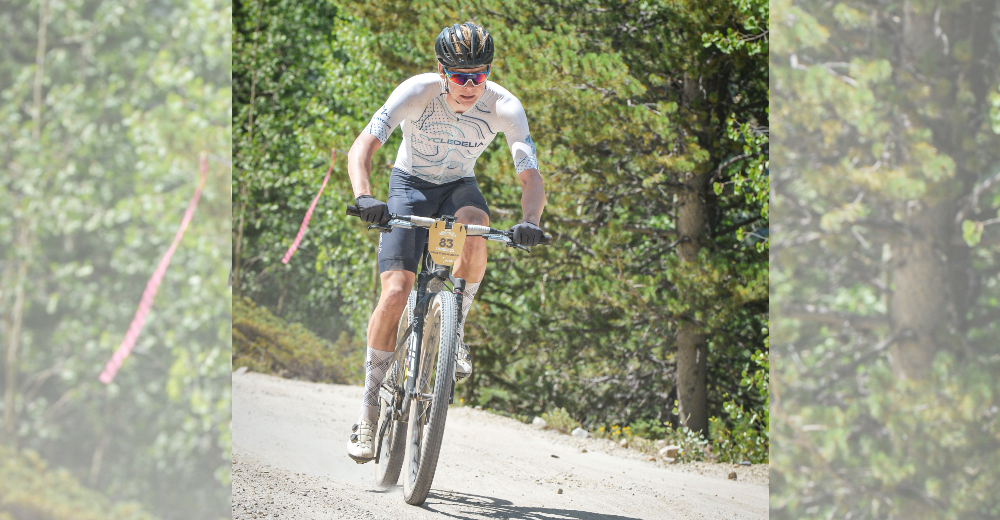Oskar Stack-Michasiw was one of Canada’s top young speed skaters when he realized his athletic talents might be better suited to the bike.
Stack-Michasiw, son of Brainsport owner Brian Michasiw and a part-time employee at the store, earned a spot on the Top 30 RBC Future Olympians list for speed skating in 2022 when he was just 16. Around that same time, he began mountain and gravel biking seriously as a form of cross-training
“I realized I was better at bike racing,” Stack-Michasiw says now at age 20. “That’s partly because I was born with a clubfoot and the imbalances were not as bad on the bike (as they were with speed skating).”
Clubfoot is a foot abnormality present at birth caused by a shortening of the Achilles tendon. Stack-Michasiw wore a brace for the first four years of his life and has done daily physical therapy exercises for as long as he can remember. The tightness in his Achilles means he’s prone to injury in sports that involve running — but he believes his clubfoot has actually made him a stronger athlete.
“It is hard, but that is a good thing because I’ve had to learn how much hard work goes into things from having to do physio exercises and deal with injuries to getting stronger in other ways to make up for my clubfoot,” he says. “I still work hard to maintain it and I’ve just learned so much from dealing with it that now I feel like I can work through pretty much anything.”
These days, Stack-Michasiw trains almost full time while working part time at Bike Doctor and on the Brainsport operations team. When the snow melts, he logs up to 30 hours a week on his bikes — often solo, across the flat Saskatchewan prairies.
“It’s not fun all the time, but I think the actual training benefit is extremely good because it makes you pretty mentally tough,” he says. “It’s so flat here and you’re riding really steady. Say you’re doing big climbs on mountains; the whole time you’re going up, you’re going a bit harder than you should be that day. And the whole time going down, you’re going way too easy. So the ability to do a five-hour ride and have it almost perfectly consistent creates a really good training effect.”
This year, Stack-Michasiw was part of the inaugural Life Time Grand Prix U23 Development Program, which gives athletes aged 18 to 22 a chance to race alongside pros in the six events that make up the 2025 Life Time Grand Prix series. He finished fourth in the program, with standings based on the athletes’ four best results.
Two of those key performances came in October in Bentonville, Arkansas. On Oct. 12, he was the fourth U23 rider (26th overall) at the Little Sugar 100-km mountain bike race. Less than a week later, he placed third among U23 athletes (28th overall) in the Big Sugar gravel event (the race, normally 100 miles, was shortened to 50 miles because of poor weather conditions).
“I knew I had that performance in my legs, but I didn’t know if I was going to be able to execute it; you never know what is going to happen,” Stack-Michasiw says. “There were so many crashes. So many people were getting stitches because the gravel roads there, the rocks are so sharp that if you fall, you don’t just get road rashes – you get some big cuts. I avoided all of that and I did what I knew that I could. But I also got some good luck.”
Stack-Michasiw says it wasn’t until near the end of the races he knew he was going to do well. “I don’t have a good sense of how the race is going,” he says. “In the first race I don’t think I realized until I crossed the line and saw the results. And, on the second day, I probably only realized 20 minutes from the finish where I was with everyone.”
With the 2025 Life Time Grand Prix season behind him, Stack-Michasiw is now heading into his off-season — a mix of gym work, running, and long hours on the trainer. He’s already setting his sights on returning to the U23 program in 2026 – and logging more miles across the flat expanses of his home province.
“This summer, I think I realized how beautiful Saskatchewan is and just how much there is to explore and how many gravel roads there are to ride that you wouldn’t normally go on,” he says. “I think that kind of just opened my eyes up to where we live and how beautiful it can be at the right seasons.”









